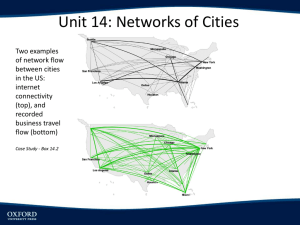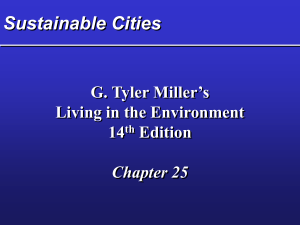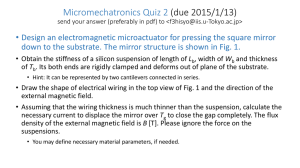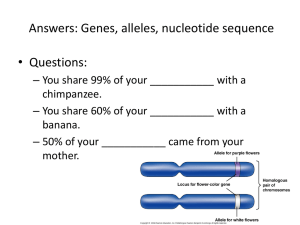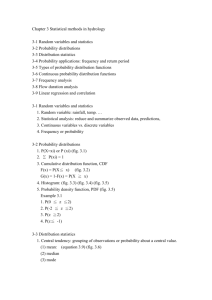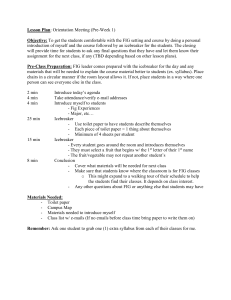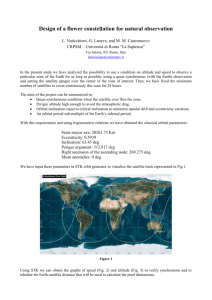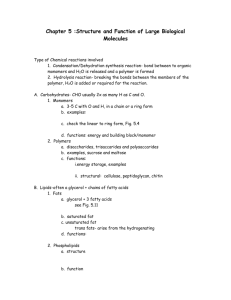Exercises Law of Tri..
advertisement
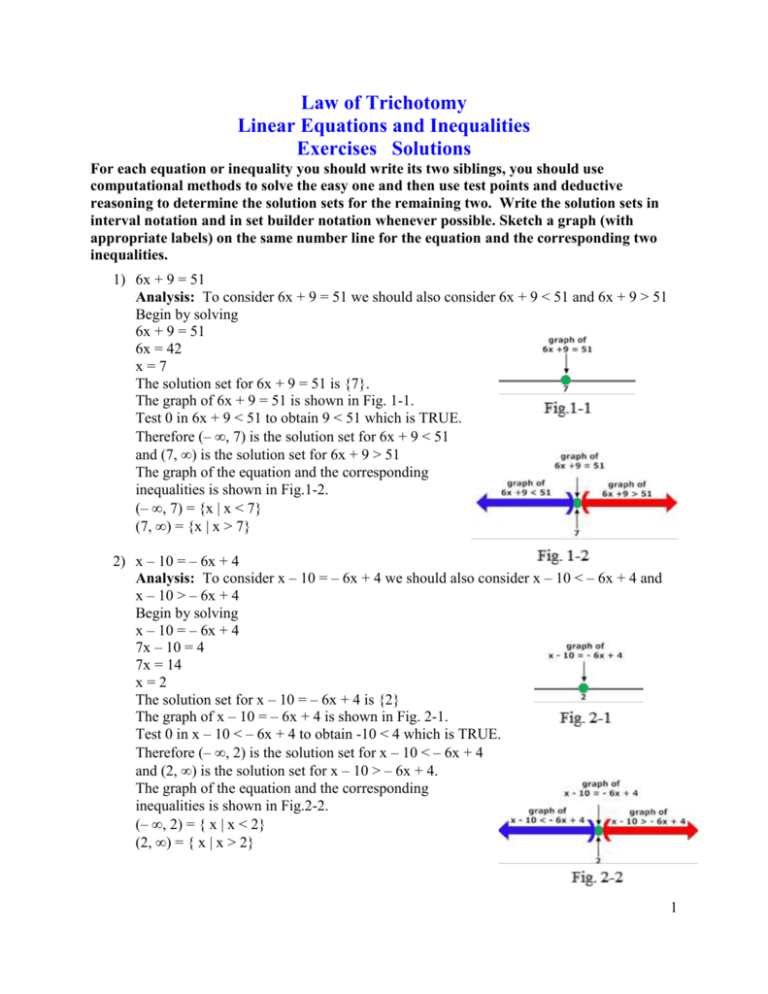
Law of Trichotomy
Linear Equations and Inequalities
Exercises Solutions
For each equation or inequality you should write its two siblings, you should use
computational methods to solve the easy one and then use test points and deductive
reasoning to determine the solution sets for the remaining two. Write the solution sets in
interval notation and in set builder notation whenever possible. Sketch a graph (with
appropriate labels) on the same number line for the equation and the corresponding two
inequalities.
1) 6x + 9 = 51
Analysis: To consider 6x + 9 = 51 we should also consider 6x + 9 < 51 and 6x + 9 > 51
Begin by solving
6x + 9 = 51
6x = 42
x=7
The solution set for 6x + 9 = 51 is {7}.
The graph of 6x + 9 = 51 is shown in Fig. 1-1.
Test 0 in 6x + 9 < 51 to obtain 9 < 51 which is TRUE.
Therefore (– , 7) is the solution set for 6x + 9 < 51
and (7, ) is the solution set for 6x + 9 > 51
The graph of the equation and the corresponding
inequalities is shown in Fig.1-2.
(– , 7) = {x | x < 7}
(7, ) = {x | x > 7}
2) x – 10 = – 6x + 4
Analysis: To consider x – 10 = – 6x + 4 we should also consider x – 10 < – 6x + 4 and
x – 10 > – 6x + 4
Begin by solving
x – 10 = – 6x + 4
7x – 10 = 4
7x = 14
x=2
The solution set for x – 10 = – 6x + 4 is {2}
The graph of x – 10 = – 6x + 4 is shown in Fig. 2-1.
Test 0 in x – 10 < – 6x + 4 to obtain -10 < 4 which is TRUE.
Therefore (– , 2) is the solution set for x – 10 < – 6x + 4
and (2, ) is the solution set for x – 10 > – 6x + 4.
The graph of the equation and the corresponding
inequalities is shown in Fig.2-2.
(– , 2) = { x | x < 2}
(2, ) = { x | x > 2}
1
3) 4x – 7 < 2x – 7
Analysis: To consider 4x – 7 < 2x – 7 we should also consider 4x – 7 = 2x – 7 and
4x – 7 > 2x – 7
Begin by solving
4x – 7 = 2x – 7
2x = 0
x=0
The solution set for 4x – 7 = 2x – 7 is {0}
The graph of 4x – 7 = 2x – 7 is show in in Fig. 3-1.
Test 1 in 4x – 7 < 2x – 7 to obtain 4 – 7 < 2 – 7 which
is equivalent to – 3 < – 5 which is FALSE.
Therefore (0, ) is the solution set for 4x – 7 > 2x – 7
and (– , 0) is the solution set for 4x – 7 < 2x – 7
The graph of the equation and the corresponding
inequalities is shown in Fig.3-2.
(0, ) = {x | x > 0}
(– , 0) = { x | x < 0}
4) 3x 1 5 2x 2
8
7
Analysis: To consider 3x 1 5 2x 2 we should also consider
8
7
3x 1 5 2x 2 and 3x 1 5 2x 2
8
7
8
7
Begin by solving
3x 1 5 2x 2
8
7
7(3x 1) 8(5 2x) 56(2)
21x 7 40 16 x 112
21x 145 16 x
5 x 145
x 25
The solution set for 3x 1 5 2x 2 is {25}
8
7
3x
1
5
2x
2 is shown in Fig. 4-1.
The graph of
8
7
Test 0 in 3x 1 5 2x 2 to get 1 2 2
8
7
8 7
which is TRUE
Therefore the solution set for 3x 1 5 2x 2 is
8
7
(– , 25) = { x | x < 25}
and the solution set for 3x 1 5 2x 2 is (25, ) = { x | x > 25}
8
7
The graph of the equation and the corresponding inequalities is shown in Fig.4-2
2
5) 3 x 5
8 3 12
Analysis: To consider 3 x 5 we should also consider 3 x 5 and 3 x 5
8 3 12
8 3 12
8 3 12
Begin by solving
3 x 5
8 3 12
9 + 8x = 10
8x = 1
x1
8
The solution set for 3 x 5 is 1
8 3 12
8
The graph of 3 x 5 is shown in Fig. 5-1.
8 3 12
3
x
Test 0 in 5 to obtain 3 5 which is equivalent to 9 10 which is TRUE.
8 3 12
8 12
24 24
Therefore the solution set for 3 x 5 is , 1 = x x 1
8
8 3 12
8
and the solution set for 3 x 5 is 1 , = x x 1
8
8 3 12
8
The graph of the equation and the corresponding inequalities is shown in Fig.5-2.
3
6) 3 2 x 5x 6
Analysis: To consider 3 2 x 5x 6 we should also consider 3 2 x 5x 6
and 3 2 x 5x 6
Begin by solving
3 2 x 5x 6
x 5x 6 3 2
x 5x 6 3 2
( 5)x 6 3 2
x 63 2
5
The solution set for 3 2 x 5x 6 is 6 3 2
5
Useful Aside: 2 is less than 2, so 3 2 is less than 6
and that means the numerator 6 3 2 is positive.
Clearly the denominator 5 is negative. A positive
numerator and negative denominator produce a
negative fraction. So this solution is to the left of 0 on
the number line.
The graph of 3 2 x 5x 6 is shown in Fig. 6-1
The location of 0 relative to this solution is also indicated in Fig.6-1.
Test 0 in 3 2 x 5x 6 to obtain 3 2 6 which is TRUE
Therefore 6 3 2 , = x x 6 3 2 is the solution set for 3 2 x 5x 6
5
5
and , 6 3 2 = x x 6 3 2 is the solution set for 3 2 x 5x 6
5
5
The graph of the equation and the corresponding inequalities is shown in Fig.6-2.
4
7) –x + 5 > 6
Analysis: To consider –x + 5 > 6 we should also
consider – x + 5 = 6 and – x + 5 < 6.
Begin by solving
–x+5=6
x = –1
The solution set for –x + 5 = 6 is {–1}
The graph of – x + 5 = 6 is shown in Fig. 7-1.
Test 0 in – x + 5 < 6 to obtain 5 < 6 which is TRUE
Therefore (– 1, ) = x x 1 is the solution set for – x + 5 < 6
and (– ,– 1) x x 1 is the solution set for – x + 5 > 6.
The graph of the equation and the
corresponding inequalities is shown in Fig.7-2
8) 7 + 8x > 9x + 12
Analysis: To consider 7 + 8x > 9x + 12 we should
also consider 7 + 8x = 9x + 12 and 7 + 8x < 9x + 12.
Begin by solving
7 + 8x = 9x + 12
8x = 9x + 5
–x=5
x=–5
The solution set for 7 + 8x = 9x + 12 is {– 5}.
The graph of 7 + 8x = 9x + 12 is shown in Fig. 8-2.
Test 0 in 7 + 8x > 9x + 12 to obtain 7 > 12 which is FALSE.
Therefore the solution set for 7 + 8x > 9x + 12 is (– , – 5) = x x 5
and the solution set for 7 + 8x < 9x + 12 is (– 5, ) = x x 5
The graph of the equation and the corresponding inequalities is shown in Fig.8-2
5
9) 10 + x < 6x – 10
Analysis: To consider 10 + x < 6x – 10 we should also
consider 10 + x = 6x – 10 and 10 + x < 6x – 10.
Begin by solving
10 + x = 6x – 10
5x = 20
x=4
The solution set for 10 + x = 6x – 10 is {4}
The graph of 10 + x = 6x – 10 is shown in Fig. 9-1.
Test 0 in 10 + x < 6x – 10 to obtain 10 < –10 which is false
Therefore the solution set for 10 + x < 6x – 10 is (4, ) = x x 4
and the solution set for 10 + x > 6x – 10 is
(–, 4) = x x 4
The graph of the equation and the corresponding inequalities is shown in Fig.9-2
6
10) 3x 2 1 2x 1
18
6
2
Analysis: To consider 3x 2 1 2x 1 we should also consider
18
6
2
3x 2 1 2x 1 and 3x 2 1 2x 1
18
6
2
18
6
2
Begin by solving
3x 2 1 2x 1
18
6
2
(3x 2) 3(1 2x) 9
3x 2 3 6x 9
3x 1 9
3x 8
x8
3
The solution set for 3x 2 1 2x 1 is 8
18
6
2
3
The graph of 3x 2 1 2x 1 is shown in Fig. 10-1
18
6
2
3x
2
1
2x
1
to obtain
Test 0 in
18
6
2
2 1 1 which is equivalent to 2 3 9
18 6
2
18 18
18
which is equivalent to 1 9 which is equivalent to 1 9
18
18
18 18
Which is FALSE
Therefore the solution set for 3x 2 1 2x 1 is 8 , x x 8
3
3
18
6
2
and the solution set for 3x 2 1 2x 1 is , 8 x x 8
3
3
18
6
2
The graph of the equation and the corresponding inequalities is shown in Fig.10-2
7
